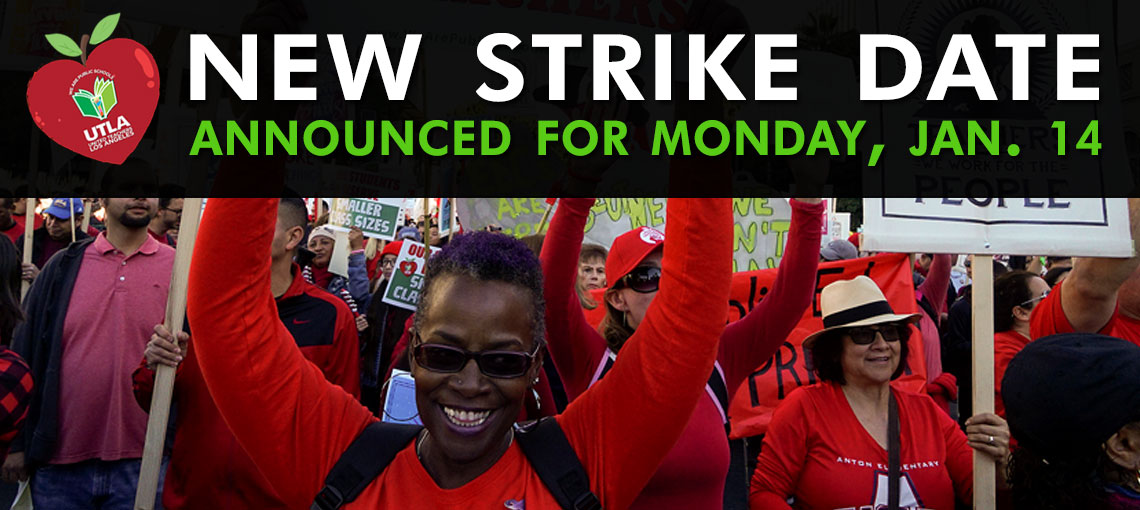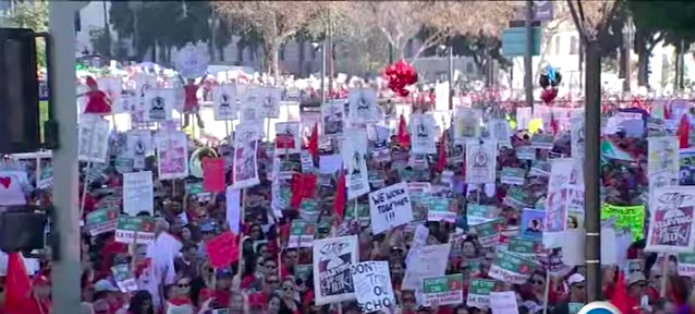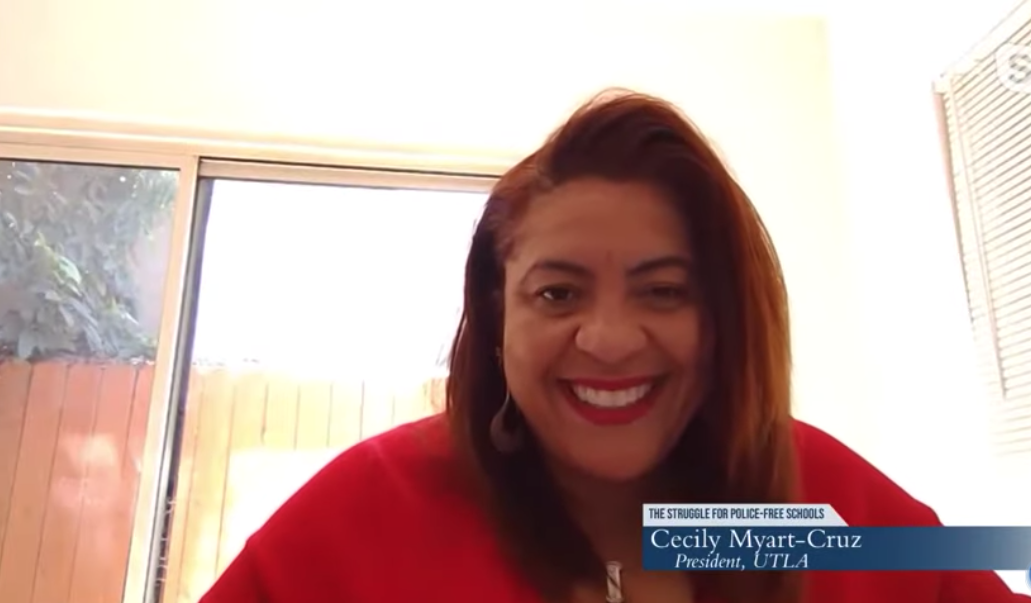
UTLA website photo
LAUSD Strike: Teachers Union ‘Insulted’ by Latest Offer
Education policy expert says there’s lots of blame to go around when it comes to the Los Angeles teachers strike
By Katy Grimes, January 14, 2019 1:25 am
Gov. Gavin Newson has only been governor for seven days and is already facing the first strike in 30 years at the Los Angeles Unified School District, the nation’s second largest school district.
The United Teachers of Los Angeles labor union says low teacher pay, poor working conditions, large class sizes, and the growing demand for charter schools and school choice are chief among their complaints.
The LAUSD teaches more than 600,000 kids with 30,000 teachers in 1,100 public schools.
For months, teachers have been threatening to strike for better pay. Yet the LAUSD budget is weighed down by retirement and health obligations, which policy analysts say could get in the way of long-term teacher pay increases.
“The demands of the United Teachers of Los Angeles bear no relation to this fiscal reality,” said education scholar Lance Izumi, in an interview. Izumi is the Director of Education Studies at the Pacific Research Institute.
“The union wants retroactive 6.5% pay raises going back to 2016 and more staff in every school. The union wants to use the district’s reserve to pay for their demands, but that reserve is already at a minimum level, so giving in to the union’s demands would push the district into insolvency and potentially liability for a state takeover.”
One of the biggest beefs the United Teachers of Los Angeles labor union has is with charter schools. Only one day after setting the date for the strike, the union’s president called for an “immediate” cap on the number of charter schools in the district.
UTLA is also calling for “Charter School accountability,” something Gov. Gavin Newsom said he was accounting for in his budget, during his press conference Thursday, where he presented his 2019-20 Budget. “I’m not anti-charter schools,” he said, but added that charters need transparency.

The UTLA labor union claims charter schools siphon off students and money from the district. The union accuses LA Schools Superintendent Austin Beutner of working to vastly expand the number of charter schools in an attempt at privatization.
“Even worse, UTLA’s secretary Arlene Inouye now says that the strike ‘is not just about salary,’” Izumi said. “UTLA president Alex Caputo-Pearl has recently called for a cap on the growth of charter schools in Los Angeles, which has more charter schools than any other school system in the nation. Charter school enrollment in Los Angeles has increased because parents have been dissatisfied with the performance of regular district public schools, which are staffed by UTLA’s teachers,” Izumi added.
Izumi said that while UTLA and its allies claim that charter schools inadequately serve the needs of low-income and minority students, the data demonstrates that charters are improving the achievement of those students. “According to a 2017 study by the school-research-and-rating organization GreatSchools, there were 156 public schools in California ‘that are providing strong results for African-American students and Hispanic students.’ While only a little more than one in 10 public schools statewide is a public charter school, among these 156 high-performing schools, nearly one out of three was a charter school,” Izumi said.
UTLA and the Los Angeles Unified School District have been deadlocked in contract negotiations since April 2017, and teachers have been working without a contract for more than one year. The LAUSD has offered a three year contract with a 6 percent pay raise spread over the first two years; the union wants a 6.5 percent raise retroactive for a third year.
“Even with $1.86 billion reserves, the LAUSD says it does not have the money to improve our schools to include lower class sizes, accountability for charter schools and a real reinvestment in school safety, vital staffing and educational programs,” UTLA says on its website. “Since 2008, the cost of living in LA has increased 27% yet the district offers stagnant wages and healthcare.”
Izumi said in August 2018, the chief financial officer of the Los Angeles County Office of Education, Candi Clark, warned that “LAUSD is not too big to fail,” and that the County could impose a fiscal advisor on LAUSD “to ensure that the district remains fiscally solvent.”
“The district must meet legally required minimum budget reserve requirements, but it can only do so, according to the County, if it makes $144 million in reductions between 2019-20 and 2020-21,” Izumi said. “However, even if these reductions are made, the County says that it would not eliminate the district’s structural deficit. “
Indicative of the seriousness of the LAUSD fiscal solvency issues, last week the Los Angeles County Office of Education appointed “a team of fiscal experts to work with Los Angeles Unified to develop a Fiscal Stabilization Plan that will eliminate deficit spending and restore required financial reserve levels,” according to the LAUSD.
“There is lots of blame to go around when it comes to the Los Angeles teachers strike,” Izumi said. “First, the Los Angeles school board has had a terrible history of fiscal mismanagement.”
“In 2017, for example, the then pro-union school board approved full health benefits for part-time workers, despite warnings from its own district officials that the district was headed toward bankruptcy because of huge unsupportable benefit and pension obligations,” Izumi said.
Izumi continued: “Further, a significant number of the high-performing charter schools were located in Los Angeles, including, for example, many charters that are part of the Los Angeles-based Alliance for College-Ready Public Schools. According to the Alliance’s own data, students at their charters score 82 percent higher in math and 48 percent higher in English than students at neighboring public schools. Virtually all Alliance students, 98 percent, are either Hispanic or African American.”
“The bottom line is that the Los Angeles teachers strike is a perfect storm of bad policies, bad management, bad demands, and, too often, bad actors,” Izumi said. “The result will be bad news for students, parents and taxpayers.”





Let them strike. I for one am sick and tired of having to pay to educate illegals!
RedforEd is a Communist movement; they are up to their eyes in the teacher’s unions. Just look at what has happened in Arizona since those same unions illegally struck the state’s school districts. Test scores went down even more, and Arizona is almost the best of the bottom feeders in education.
Stop the union monopoly on primary public education. Taxpayers should expect that high school graduates can at least be literate and able to balance a checkbook.